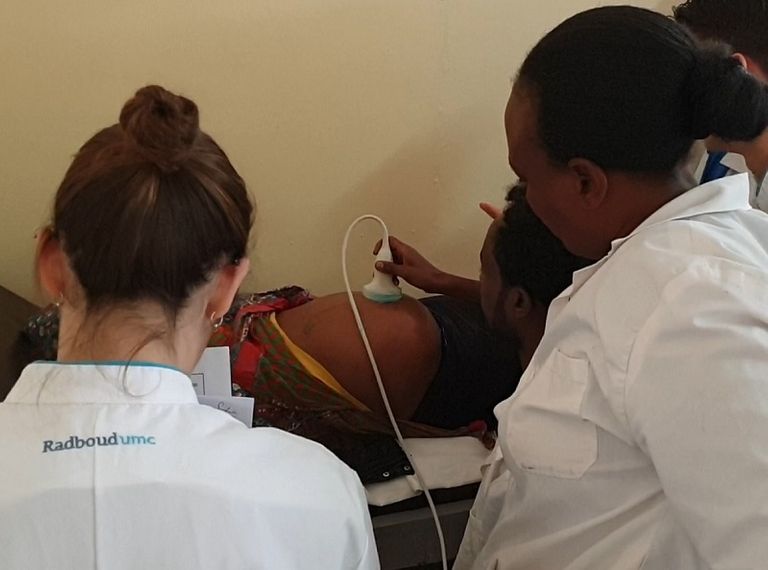
Background
Every day more than 800 women die as a consequence of their pregnancy, of which the vast majority occur in low-income countries. Ultrasound imaging can be used to detect maternal risk factors and is recommended by the World Health Organization. Unfortunately, ultrasound is barely used in these countries. This is caused by the lack of trained sonographers that can perform prenatal scanning and the high cost of ultrasound equipment. The latter obstacle is alleviated by handheld ultrasound devices that are now becoming available on the market for relatively low prices. Most of these devices can be connected to a smartphone or tablet. To obviate the need of a trained sonographer, we propose to combine a standardize acquisition protocol (consisting of several sweeps over the belly of the pregnant woman) with real-time feedback by deep learning algorithms followed by automated interpretation with deep learning. In the past, algorithms were developed in our group for automated to detect twin pregnancies, estimate gestational age, determine fetal presentation and determine placenta location. All developed algorithms were ported to an Android based app called the BabyChecker and our industry partner Delft Imaging has started data collection and field tests in several African countries. Delft Imaging is funding this Ph.D. position.
This project builds upon our prior work. These movies describe that work:
Your profile
You should be a highly motivated, creative, and enthusiastic researcher with an MSc degree in Computer Science, Data Science, Physics, Mathematics, Engineering, or related. You have a good understanding of deep learning and have the skills to adapt deep learning algorithms. Good knowledge of medical imaging, ultrasound in particular, is a plus. You need excellent communication skills. The research should result in a Ph.D. thesis.
Job description
You will work on extending the capabilities of the BabyChecker with
- improving the real-time feedback to guide during the acquisition of the sweeps, so that acquisition errors can be prevented or immediately corrected,
- developing and validating several new automated algorithms for example for the detection of fetal viability, detection of placenta previa, and estimation of the amount of amniotic fluid;
- improve the performance of the existing algorithms;
- increase the robustness of the deep learning algorithms so they provide accurate results with data from multiple types of hand-held ultrasound devices that are available on the market today.
All algorithms should be computationally efficient so they can be run on a smartphone. We expect you'll be using and extending state-of-the-art frameworks for deep learning on low-cost devices. We also expect you to be active in data collection and field testing and interested to travel to Africa and other sites where the BabyChecker is used.
Organization
You will be part of two research groups within the Department of Medical Imaging at Radboudumc: the Medical UltraSound Imaging Center (MUSIC) and the Diagnostic Image Analysis Group (DIAG).
MUSIC is an international expertise center that develops ultrasound based techniques for improved diagnosis, guiding intervention and monitoring treatment. The close collaboration with clinicians on one side and commercial partners on the other side warrants that these techniques not only result in academic output, but also are translated to clinical applications and when appropriate to commercial products. Point-of-care ultrasound (ultrasound using handheld devices) is a new research line within MUSIC.
DIAG is an internationally renowned group on deep learning for medical imaging. DIAG currently has 50 deep learning researchers focused on various medical image analysis topics. The focus of DIAG is the development and validation of novel methods in a broad range of medical imaging applications. The key to the success of DIAG is close cooperation with clinicians. A team of scientific programmers supports deep learning research, maintaining a high-performance compute cluster with over 100 GPUs for large-scale experimentation.
Radboud UMC is a leading Dutch academic center for medical science, education, and healthcare with over 8,500 staff and 3,000 students, located in Nijmegen. Nijmegen is the oldest city in The Netherlands. It has a rich history and one of the liveliest city centers in the country. Radboud University and Radboudumc are located on a compact green campus with over 17,000 students.
Applications
To apply, click here. Your application must include a motivation letter that clearly explains your match to all aspects of the requested profile. Your letter is supplemented by a complete CV, summary grades, and links to your code and your publications.
Information
Questions can be directed to Bram van Ginneken or Chris de Korte by e-mail.

